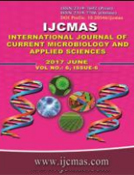


 National Academy of Agricultural Sciences (NAAS)
National Academy of Agricultural Sciences (NAAS)

|
PRINT ISSN : 2319-7692
Online ISSN : 2319-7706 Issues : 12 per year Publisher : Excellent Publishers Email : editorijcmas@gmail.com / submit@ijcmas.com Editor-in-chief: Dr.M.Prakash Index Copernicus ICV 2018: 95.39 NAAS RATING 2020: 5.38 |
The effect of cow-urine and bio-fertilizers based fertigation schedule was studied at varying levels of drip irrigation on various cucumber parameters in a naturally ventilated polyhouse during summer season. The experiment was conducted in a randomized block design with 11 treatments and 3 replication comprising of two drip irrigation levels viz., I2(IW/CPE= 0.4) and I4 (IW/CPE = 0.8), five fertigation levels and one farmers’ practice. The total soluble solids (TSS) were numerically higher in irrigation level I2 than in I4. The yield was statistically higher in different treatments compared to farmers’ practice (4.47 kg m-2). The gross return and B: C ratio were highest in treatment F2I4 (where F2 is 100 % of recommended NPK doses (1/3rd N and full P, K applied as basal and 2/3rdN through fertigation + Azotobacter + PSB) and 5% cow-urine) and were lowest under farmers’ practice. However, the irrigation levels didn’t influence the marketable yield. The overall results indicated that combined application of bio-fertilizers and fertilizers has positive effect on yield, growth and quality parameter due to addition of nutrients and saving of at least 50 % of water and hence can be exploited as a sustainable approach under integrated nutrient management.
 |
 |
 |
 |
 |